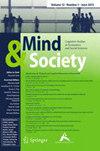瑜伽和冥想对COVID- 19大流行期间压力症状的作用
Q1 Arts and Humanities
引用次数: 0
摘要
缺乏关于健康状况的信息、缺乏对疾病的控制以及对任何疾病未来趋势的不确定都是压力的主要来源。在冠状病毒大流行期间,每个人,无论年龄、社会经济地位和性别,都面临着不确定、信息过载、恐慌和往往失控的状态。压力的体验取决于一个人的应对能力和生活方式。瑜伽和冥想可能是在当前大流行的情况下的重要工具,有助于管理压力和促进自我调节。目的探讨新冠肺炎大流行期间,不同程度瑜伽和冥想练习者压力阳性和阴性症状的差异。采用随机抽样技术进行数据采集。这项调查共有102人参与。只有95名参与者符合纳入标准。调查中的问题是在心理学、医学和瑜伽专家的帮助下准备的。采用调查设计。对数据进行描述性统计分析,采用频率表和柱状图。参与者被分为四组,经常练习瑜伽/冥想(第一组,n= 22),经常(第二组,n=18),有时(第三组,n=32)和从不(第四组,n=23)。结果显示,与从未练习瑜伽/冥想的第四组相比,总是、经常或有时练习瑜伽/冥想的第一组、第二组和第三组的受访者有更好的生活质量,睡眠充足,控制愤怒,体验幸福,内心平静和注意力集中。本文章由计算机程序翻译,如有差异,请以英文原文为准。
Role of Yoga and Meditation on Symptoms of Stress during COVID- 19 Pandemic
Lack of information about heath conditions, lack of control over disease and uncertainty about the future trend of any disease are the essential sources for stress. During the period of corona virus pandemic everyone, irrespective of age, socio- economic status and gender faces a state of uncertainty, over load of information, panic and often find the situation out of control. The experience of stress depends on a person’s coping abilities and life style practices. Yoga and meditation may be important tools in this current pandemic scenario, helping to manage stress and promote self- regulation. The Objective is to explore the difference in positive and negative symptoms of stress among people practicing yoga and meditation in different degree during COVID-19 pandemic. Incidental sampling technique was used to collect data. The survey was conducted on 102 participants. Only 95 participants fulfilled the inclusion criteria. The questions to be asked for survey were prepared with the help of experts from Psychology, Medicine and yoga experts. Survey design was used. For analyzing the data descriptive statistics, frequency table and bar graph were used. The participants were divided into four groups practicing Yoga/Meditation always (Group I, n= 22), often (Group II, n=18), sometime (Group III, n=32) and never (Group IV, n=23). Result reveals that respondent of group I, group II and group III who always, often or sometimes practiced yoga/ meditation had better quality of life, sufficient sleep, control of anger, and experience of happiness, peace of mind and concentration of mind as compared to group IV who never practiced yoga/meditation.
求助全文
通过发布文献求助,成功后即可免费获取论文全文。
去求助
来源期刊

Mind and Society
Arts and Humanities-Philosophy
CiteScore
2.30
自引率
0.00%
发文量
5
期刊介绍:
Mind & Society is a journal for ideas, explorations, investigations and discussions on the interaction between the human mind and the societal environments. Scholars from all fields of inquiry who entertain and examine various aspects of these interactions are warmly invited to submit their work. The journal welcomes case studies, theoretical analysis and modeling, data analysis and reports (quantitative and qualitative) that can offer insight into existing frameworks or offer views and reason for the promise of new directions for the study of interaction between the mind and the society. The potential contributors are particularly encouraged to carefully consider the impact of their work on societal functions in private and public sectors, and to dedicate part of their discussion to an explicit clarification of such, existing or potential, implications.Officially cited as: Mind Soc
 求助内容:
求助内容: 应助结果提醒方式:
应助结果提醒方式:


